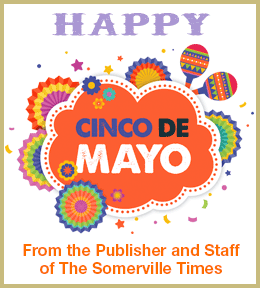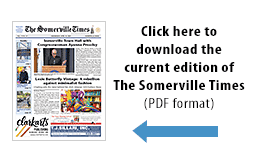By Union United
(The opinions and views expressed in the commentaries of The Somerville Times belong solely to the authors of those commentaries and do not reflect the views or opinions of The Somerville Times, its staff or publishers)
How can a community shape development according to its needs? For a coalition of local stakeholders in Somerville’s Union Square, this is the central question driving the effort to ensure that equity is the foundation of neighborhood revitalization, not an afterthought.
Union Square is a neighborhood in transition. In anticipation of the now fully funded Green Line Extension, the City has hired a master developer, (Union Square Station Associates, or US2) to revitalize seven key parcels around the Union Square station. Unfortunately, many of Union Square’s residents and business owners, particularly renters, are worried that they won’t be able to enjoy the benefits of new transit and development because of increasing speculation and rising rents.
In May of 2014, community leaders launched the Union United coalition. With over 100 members and 13 organizations, including homeowners, renters, small business owners, community organizations, labor unions, immigrant groups, and faith congregations, we came together to create a framework for equitable outcomes. Through researching best practices from other communities, we realized that a community benefits agreement (CBA) is the right tool to ensure equitable development.
CBAs are legally enforceable contracts between developers and community coalitions that address a broad range of community needs while ensuring that local stakeholders can influence the development process. An early commitment to public benefits ensures a smoother process for the developer and promotes collaborative approaches to community needs instead of legal battles.
Throughout the spring and summer of 2014, Union United members developed a set of shared priorities. Union United’s proposed CBA, which we hope will be part of the CBA signed by US2, includes specific requirements to ensure affordable housing, local jobs, workers’ rights, small businesses, community resources, open space, arts and culture, public safety, and participatory planning. Union United believes that community members, particularly those most vulnerable to displacement, should be at the heart of the decision-making process and have a seat at the table to help craft a community benefits agreement.
In order to build support for the idea of a CBA, we testified at public meetings and events and met with aldermen, City staff, and US2 to share our agenda. We built a broad consensus among coalition members, local allies, and the appointed Civic Advisory Committee (CAC) that a CBA will be essential in Union Square. On December 9, the Somerville Redevelopment Authority (SRA) and US2 culminated six months of intense work by signing a Master Developer Designation Agreement. This document is supposed to be a framework for future land disposition agreements and “one or more Community Benefits Agreements.”
Union United considers the signing of this agreement a victory and a challenge. Through our work as a coalition, we have ensured that there will be a community benefits agreement as part of the Union Square redevelopment. However, the existence of a CBA does not necessarily ensure that the process will be transparent, enforceable, and community-driven.
After they were selected as the master developer, US2 hosted a kickoff for their “100 Days of Engagement,” in which stakeholders were invited to share ideas about the future of Union Square and participate in interviews with the developer. Jamie Chisholm, the community engagement specialist who conducted the engagement interviews, is no longer a presence at CAC or Somerville by Design meetings. What happened to those ideas?
The CAC, which has been described as the vehicle for all community input in the development process, apparently was not aware of the content of the master developer designation agreement before it was released and did not have influence over the final wording. All of the potential CBA topics mentioned in the agreement are priorities for the CAC and Union United. But what was the process by which the City and developer decided on these topics and not others? Isn’t that what the neighborhood planning process and CAC meetings are for?
This is where our work lies: in making sure that the community is actually involved in the CBA conversation and at the table when negotiations take place to make sure this is an equitable development.
We are encouraged by the accessibility of the Somerville by Design neighborhood planning process, and plan to participate actively in those workshops. At a recent visioning session, we noticed that the conversation revolved around design considerations. There must be a space within this process for community members to discuss not just the physical, but the social impact of redevelopment, because what truly makes Union Square special are the people who live, work, and play here. As a community, we have to start by discussing and making decisions about displacement and diversity in the context of new development. How can we also use this process to advance long-term community building goals to keep people in our City?
Community members want to be able to track decision-making throughout the process and to work with the City and the developer to ensure that the final CBA is truly community-driven. “When my husband and I moved to Massachusetts, we read SomerVision and saw many of our own values reflected,” says Kristen Lucas, a Union United member who lives on Everett Street, next to one of the development parcels. “I joined Union United because I believe that we can make the redevelopment process an opportunity to live out the values and achieve the goals described in SomerVision through a community-driven CBA. I want to make sure that the people who live and work here today are at the heart of every decision along the way.”
Now more than ever, we need to pursue anti-displacement strategies that protect and improve our community. In 2015, we will continue building community power and organizing around equitable development; participating in planning processes like Somerville by Design and the citywide rezoning; and piloting the community benefits model for the Green Line corridor. We have a lot to be proud of in our accomplishments of the past year, but we still have much work ahead of us.
* Union United is a coalition rooted in Union Square working to ensure that the Union Square redevelopment process results in benefits and not displacement for our community. We are residents, small businesses, labor unions, youth, churches, and community groups.
















Reader Comments